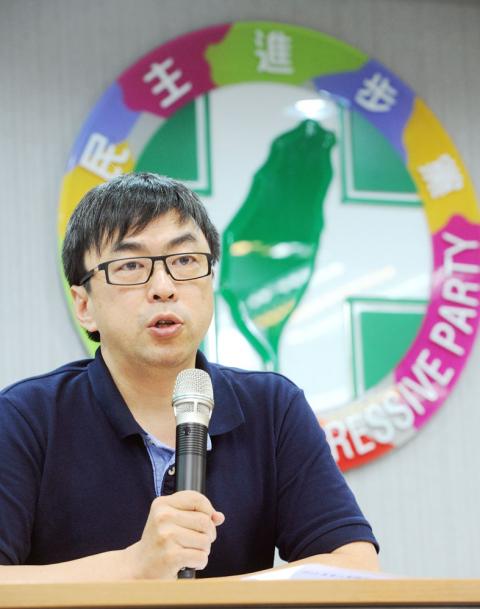Former president Chen Shui-bian (陳水扁) will apply to return to the Democratic Progressive Party (DPP) and could see his application approved at the party congress on Saturday.
Chen, who is serving a 20-year sentence for corruption, has authorized DPP caucus convener Ker Chien-ming (柯建銘) to submit an application for DPP membership, almost five years after his withdrawal from the party in August 2008 amid escalating controversy surrounding his corruption probe, the DPP confirmed yesterday.
The application, once submitted, would have to go through a standard process, which begins with a local party office’s preliminary review before a final review of a special panel of the party headquarters, DPP Secretary-General Lin Hsi-yao (林錫耀) told reporters in a briefing after a Central Standing Committee weekly meeting.

Photo: Wang Min-wei, Taipei Times
“DPP regulations only bar gangsters from joining the party, which is commonly known as the anti-mafia clause. [The application] is not a big deal, as we do not try to filter the good guys and the bad guys,” Lin said.
Lin added that a proposal to reinstate the former president’s membership, which was endorsed by hundreds of DPP members and was scheduled to be submitted on Saturday, is a “non-issue” because Chen had neither been suspended nor expelled from the party.
That was why Chen would not be subject to an automatic five-year ban for suspended or expelled members and could submit an application anytime, he added.
Chen’s possible return has been a hot topic in the DPP for some time, with some voicing strong opposition to the issue due to the negative impact and controversy it might cause.
The former president’s return could also mean that his son, Chen Chih-chung (陳致中), who also withdrew from the party in 2010, could follow the same path.
Chen Shui-bian’s possible re-instatement will not be the only challenge for the DPP and party Chairman Su Tseng-chang (蘇貞昌) on Saturday.
The party congress, which is scheduled to be held at the Taipei International Convention Center, is expected to discuss whether members who have belonged to the party for less than two year should be barred from voting in party elections to avoid interference in intraparty politics by taking advantage of nominal member breeding, a perennial headache for the party, Lin said.
The other major issue, which could be crucial for the party’s nomination process and chances in the seven-in-one elections next year, is the party primary format, Lin said. DPP party representatives would have to decide whether primarys would solely be decided by public opinion polls or whther the old system would be brought back, which combines the results of member voting and public opinion polls.
Meanwhile, DPP lawmaker Tuan Yi-kang (段宜康), appointed by Su as head of an investigation panel to probe the recent controversy surrounding member recruitment involving mass applications and reputed gangsters, released the panel’s findings yesterday.
Investigations found no evidence linking Ker Chien-ming and Lin Yao-wen (林耀文), director of former premier Frank Hsieh’s (謝長廷) office, with applications from gangsters after the pair was accused of mobilizing gang members to join the DPP.
The panel did find several unusual member recruitment activities in various local party chapters, which it said former independent lawmaker Lo Fu-chu (羅福助) was probably behind. Lo is a fugitive gang member who is now believed to be living in China.

The Ministry of Education (MOE) is to launch a new program to encourage international students to stay in Taiwan and explore job opportunities here after graduation, Deputy Minister of Education Yeh Ping-cheng (葉丙成) said on Friday. The government would provide full scholarships for international students to further their studies for two years in Taiwan, so those who want to pursue a master’s degree can consider applying for the program, he said. The fields included are science, technology, engineering, mathematics, semiconductors and finance, Yeh added. The program, called “Intense 2+2,” would also assist international students who completed the two years of further studies in

Former president Tsai Ing-wen (蔡英文) departed for Europe on Friday night, with planned stops in Lithuania and Denmark. Tsai arrived at Taiwan Taoyuan International Airport on Friday night, but did not speak to reporters before departing. Tsai wrote on social media later that the purpose of the trip was to reaffirm the commitment of Taiwanese to working with democratic allies to promote regional security and stability, upholding freedom and democracy, and defending their homeland. She also expressed hope that through joint efforts, Taiwan and Europe would continue to be partners building up economic resilience on the global stage. The former president was to first

Taiwan will now have four additional national holidays after the Legislative Yuan passed an amendment today, which also made Labor Day a national holiday for all sectors. The Chinese Nationalist Party (KMT) and Taiwan People’s Party (TPP) used their majority in the Legislative Yuan to pass the amendment to the Act on Implementing Memorial Days and State Holidays (紀念日及節日實施辦法), which the parties jointly proposed, in its third and final reading today. The legislature passed the bill to amend the act, which is currently enforced administratively, raising it to the legal level. The new legislation recognizes Confucius’ birthday on Sept. 28, the

The Taipei District Court sentenced babysitters Liu Tsai-hsuan (劉彩萱) and Liu Jou-lin (劉若琳) to life and 18 years in prison respectively today for causing the death of a one-year-old boy in December 2023. The Taipei District Prosecutors’ Office said that Liu Tsai-hsuan was entrusted with the care of a one-year-old boy, nicknamed Kai Kai (剴剴), in August 2023 by the Child Welfare League Foundation. From Sept. 1 to Dec. 23 that year, she and her sister Liu Jou-lin allegedly committed acts of abuse against the boy, who was rushed to the hospital with severe injuries on Dec. 24, 2023, but did not